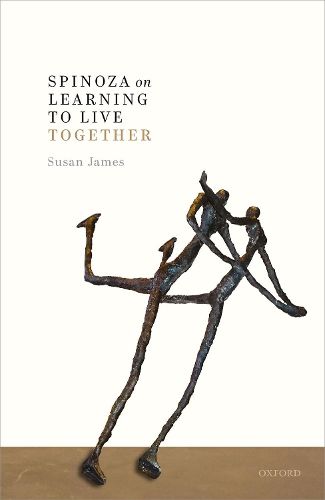Readings Newsletter
Become a Readings Member to make your shopping experience even easier.
Sign in or sign up for free!
You’re not far away from qualifying for FREE standard shipping within Australia
You’ve qualified for FREE standard shipping within Australia
The cart is loading…






Philosophising, as Spinoza conceives it, is the project of learning to live joyfully. Yet this is also a matter of learning to live together, and the surest manifestation of philosophical insight is the capacity to sustain a harmonious way of life. Here, Susan James defends this overall interpretation of Spinoza’s philosophy and explores its bearing on contemporary philosophical debates around issues such as religious toleration, putting our knowledge to work, and the environmental crisis.Part I focuses on Spinoza’s epistemology. Philosophical understanding empowers us by giving us access to truths about ourselves and the world, and by motivating us to act on them. It gives us reasons for living together and enhances our ability to live co-operatively. Part II takes up Spinoza’s claim that, to cultivate this kind of understanding, we need to live together in political communities. It explores his analysis of how states can develop a co-operative ethos. Finally, living joyfully compels us to look beyond the state to our relationship with the rest of nature. James concludes with discussions of some of the virtues this requires.
$9.00 standard shipping within Australia
FREE standard shipping within Australia for orders over $100.00
Express & International shipping calculated at checkout
Philosophising, as Spinoza conceives it, is the project of learning to live joyfully. Yet this is also a matter of learning to live together, and the surest manifestation of philosophical insight is the capacity to sustain a harmonious way of life. Here, Susan James defends this overall interpretation of Spinoza’s philosophy and explores its bearing on contemporary philosophical debates around issues such as religious toleration, putting our knowledge to work, and the environmental crisis.Part I focuses on Spinoza’s epistemology. Philosophical understanding empowers us by giving us access to truths about ourselves and the world, and by motivating us to act on them. It gives us reasons for living together and enhances our ability to live co-operatively. Part II takes up Spinoza’s claim that, to cultivate this kind of understanding, we need to live together in political communities. It explores his analysis of how states can develop a co-operative ethos. Finally, living joyfully compels us to look beyond the state to our relationship with the rest of nature. James concludes with discussions of some of the virtues this requires.